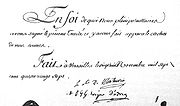
Armand Marc, comte de Montmorin
Encyclopedia


France
The French Republic , The French Republic , The French Republic , (commonly known as France , is a unitary semi-presidential republic in Western Europe with several overseas territories and islands located on other continents and in the Indian, Pacific, and Atlantic oceans. Metropolitan France...
statesman. He was Minister of Foreign Affairs and the Navy under Louis XVI.
He belonged to a junior branch of a noble family of Auvergne
Auvergne (province)
Auvergne was a historic province in south central France. It was originally the feudal domain of the Counts of Auvergne. It is now the geographical and cultural area that corresponds to the former province....
. He was gentleman-in-waiting to Louis XVI
Louis XVI of France
Louis XVI was a Bourbon monarch who ruled as King of France and Navarre until 1791, and then as King of the French from 1791 to 1792, before being executed in 1793....
when dauphin, and was subsequently appointed ambassador to Madrid
Madrid
Madrid is the capital and largest city of Spain. The population of the city is roughly 3.3 million and the entire population of the Madrid metropolitan area is calculated to be 6.271 million. It is the third largest city in the European Union, after London and Berlin, and its metropolitan...
. From Madrid he was suddenly summoned to the governorship of Brittany
Brittany
Brittany is a cultural and administrative region in the north-west of France. Previously a kingdom and then a duchy, Brittany was united to the Kingdom of France in 1532 as a province. Brittany has also been referred to as Less, Lesser or Little Britain...
, and in 1787 was appointed by the king to succeed Vergennes in the ministry of foreign affairs. Montmorin was a devoted admirer of Jacques Necker
Jacques Necker
Jacques Necker was a French statesman of Swiss birth and finance minister of Louis XVI, a post he held in the lead-up to the French Revolution in 1789.-Early life:...
, whose influence at court he helped maintain. He retired when Necker was dismissed on July 12, 1789, but on Necker's recall after the storming of the Bastille
Storming of the Bastille
The storming of the Bastille occurred in Paris on the morning of 14 July 1789. The medieval fortress and prison in Paris known as the Bastille represented royal authority in the centre of Paris. While the prison only contained seven inmates at the time of its storming, its fall was the flashpoint...
again resumed his office, which he continued to hold till October 1791. Honoré Mirabeau had approached him as early as December 1788, with a plan for the policy to be pursued by the court towards the new states general; but Montmorin, offended by Mirabeau's attacks on Necker and by his Histoire secrete de la cour de Berlin, refused to see him.
With the progress of the French Revolution
French Revolution
The French Revolution , sometimes distinguished as the 'Great French Revolution' , was a period of radical social and political upheaval in France and Europe. The absolute monarchy that had ruled France for centuries collapsed in three years...
, however, this attitude changed. The comte de la Marck was trying to bring Mirabeau into touch with the court, and for this purpose it was important to secure the assistance of Montmorin. The two men were soon on the closest terms. While Montmorin continued as minister in name, Mirabeau became so in fact. Montmorin did not dare to come to a decision without consulting Mirabeau, but neither Mirabeau nor La Marck were under any illusions as to the his character. Mirabeau complained bitterly that Montmorin was "slack" (flasque) and a "poltroon" (gavache). La Marck thought that Montmorin's feebleness was occasionally useful in restraining Mirabeau's impetuosity.
The death of Mirabeau in April 1791 was a severe blow to Montmorin, the difficulty of whose position was enormously increased after the flight of the royal family to Varennes, to which he was not privy. He was forced to resign office, but still continued to advise Louis, and was one of the inner circle of the king's friends, called by the revolutionists "the Austrian Committee." In June 1792 his papers were seized at the foreign office, without anything incriminating being discovered; in July he was denounced, and after August 10 was proscribed. He took refuge in the house of a washerwoman, but was discovered, taken before the Legislative Assembly, and imprisoned in the Abbaye, where he perished in the September massacres
September Massacres
The September Massacres were a wave of mob violence which overtook Paris in late summer 1792, during the French Revolution. By the time it had subsided, half the prison population of Paris had been executed: some 1,200 trapped prisoners, including many women and young boys...
. His relative, Louis Victor Henri, marquis de Montmorin de Saint Herem, head of the senior branch of the family, also perished in the massacre.
Sources
See- Agénor BardouxAgénor BardouxAgénor Bardoux was a French statesman and republican, son of Jacques Bardoux and wife Thérèse Pignet Agénor Bardoux (Bourges, Cher, 15 January 1829–Paris, 23 November 1897) was a French statesman and republican, son of Jacques Bardoux (Moulins, 3 February 1795 - Clermont-Ferrand, 8 January...
, Pauline de Montmorin, comtesse de Beaumont: Etudes sur la fin du XVIIIieme siècle (Paris, 1884), for a defence of Montmorin's policy; - de Bacourt, , 1789-1791 (3 vols., Paris, 1851), contains many letters of Montmorin; "Correspondence of the Comte de Moustier with the Comte de Montmorin," in the Amer. Hist. Rev., vol. viii. (1902-1903).

